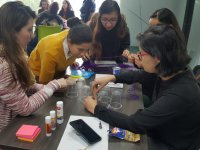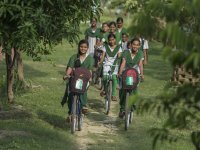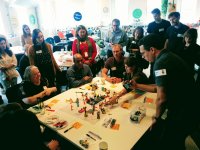The Better Government Movement (BGM), housed on Innovation.gov, builds a 21st century, delivery-driven government. BGM creates an inclusive space where public servants can grow their creative capacity and learn new tools, approaches, and mindsets to jumpstart innovation. This is in service of solving government-wide problems and affecting positive change within agencies and government writ large.
Innovation Tag: Skills and Competencies
This online course seeks to foster an innovation ecosystem in Bogota’s public offices, offering Bogota’s public officials the tools to gain capacities for public innovation.
Through practical exercises that are related to drawing and mapping, among others, public officials gain insight on ways to approach the users of public services.
The Innovation Guide is an innovation lab for learning and doing within SALAR (the Swedish Association of Local Authorities and Regions) a national members and employers’ organisation for local government in Sweden. The mission is to support public organisations who want to strengthen their employees' innovation skills and create new and better public services based on user needs. Through our unique support model with coaches all around the country we build capacity within the public sector…
Government of West Bengal provided 7.0 million bicycles to students of class IX to XII standard in Government run and aided schools as mobility support under “Sabooj Sathi” scheme – a pioneering initiative towards universal access to higher education.
The Twinning Programme is part of the Gauteng Department of Education’s wider strategic framework and its “Re-organisation of Schools” strategy. The objectives of the Twinning Programme are to improve learner outcomes and foster social cohesion in nurturing holistic learner development by creating an environment for cultural exchange through sharing expertise and resources across suburban and township schools.
A collaboration between government and community, Systemic Design eXchange (SDX) is an Edmonton-based community of practice for people interested in learning about systemic design as a methodology for addressing complex, real world issues. Together, we explore systems thinking, design thinking, and change lab approaches. With a bias towards learning by doing, SDX aims to be a watering hole where multiple sectors can come together, learn together, and act together.
Korean government has been calling for the innovation of education and training system to narrow the gap between school education and employers’ requirements and to address the high youth unemployment rate issue.
The Ministry of Employment and Labor and the Human Resources Development Service of Korea introduced the Work-Learning Dual System in 2013.
It was adopted to get rid of mismatches between school education and workplaces based on the National Competency Standards led by companies.
As part of the strategy about bringing schools into the digital era, 72 middle schools (pupils from age 11 to 15 years) have been selected to receive support for integrating digital technology into their teaching and the school administration. These 72 pilot “collèges connectés” are meant to be innovation and change leaders.
“Kanyashree Prakalpa” (Kanya means daughter, Shree means prosperity) is a unique end-to-end ICT driven Conditional Cash Transfer programme- aims at improving lives of millions of adolescent girls having poor socioeconomic background through Educational, Social, Financial & Digital Empowerment. It has so far changed lives of 4.2 mn adolescent Girls in 4 years.
The Health Office launched a partnership Strategy program to promote the uptake of midwives and health facilities, establishing a synergy between Shamans and Village Midwives. The results of this problem have cut by more than half the maternal mortality rate during child birth.



